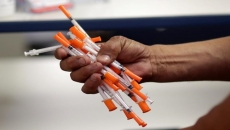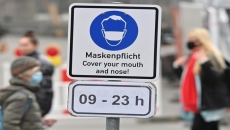Pfizer said Tuesday that its experimental pill to treat COVID-19 appears effective against the omicron variant.
Recent laboratory data also suggests that the oral antiviral candidate will be effective against current variants of concern, including #Omicron.
— Pfizer Inc. (@pfizer) December 14, 2021
The company also said full results of its 2,250-person study confirmed the pill's promising early results against the virus: The drug reduced combined hospitalizations and deaths by about 89% among high-risk adults when taken shortly after initial COVID-19 symptoms.
Separate laboratory testing shows the drug retains its potency against the omicron variant, the company announced, as many experts had predicted. Pfizer tested the antiviral drug against a man-made version of a key protein that omicron uses to reproduce itself.
The updates come as COVID-19 cases, deaths and hospitalization are all rising again and the U.S. hovers around 800,000 pandemic deaths. The latest surge, driven by the delta variant, is accelerating due to colder weather and more indoor gatherings, even as health officials brace for the impact of the emerging omicron mutant.
The Food and Drug Administration is expected to soon rule on whether to authorize Pfizer’s pill and a competing pill from Merck, which was submitted to regulators several weeks earlier. If granted, the pills would be the first COVID-19 treatments that Americans could pickup at a pharmacy and take at home.
Pfizer’s data could help reassure regulators of its drug's benefit after Merck disclosed smaller-than-expected benefits for its drug in final testing. Late last month, Merck said that its pill reduced hospitalizations and deaths by 30% in high-risk adults.
Both companies initially studied their drugs in unvaccinated adults who face the gravest risks from COVID-19, due to older age or health problems, such as asthma or obesity.
Pfizer is also studying its pill in lower-risk adults — including a subset who are vaccinated — but reported mixed data for that group on Tuesday.
In interim results, Pfizer said its drug failed to meet its main study goal: sustained relief from COVID-19 for four days during or after treatment, as reported by patients. But the drug did achieve a second goal by reducing hospitalizations by about 70% among that group, which included otherwise healthy unvaccinated adults and vaccinated adults with one or more health issues. Less than 1% of patients who got the drug were hospitalized, compared with 2.4% of patients who got a dummy pill.
An independent board of medical experts reviewed the data and recommended Pfizer continue the study to get the full results before proceeding further with regulators.
Across both of Pfizer’s studies, adults taking the company's drug had a 10-fold decrease in virus levels compared with those on placebo.
The prospect of new pills to fight COVID-19 can’t come soon enough for communities in the Northeast and Midwest, where many hospitals are once again being overloaded by incoming virus cases.
Both the Merck and Pfizer pills are expected to perform well against omicron because they don’t target the coronavirus’ spike protein, which contains most of the new variant’s mutations.
Centers for Disease Control and Prevention Director Rochelle Walensky, appearing on NBC’s “Today” on Tuesday, said the best way for people to protect themselves against COVID-19 is to get vaccinated and get a booster shot. She said the Pfizer pill, if authorized by the FDA, “will be another great tool, but we need to diagnose people early.”
The U.S. government has agreed to purchase enough of Pfizer’s drug to treat 10 million people and enough of Merck’s to treat 3 million, pending FDA authorization.






